Innovating during COVID-19 to reduce maternal and child mortality in Zambia
Chime Asonye
Nov. 13, 2020
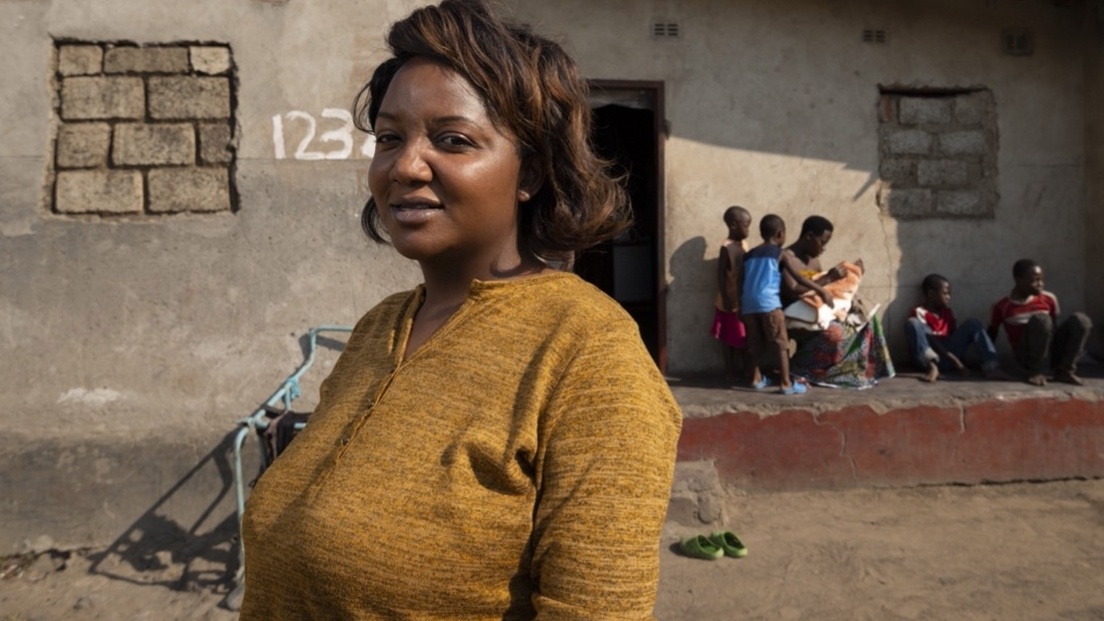
Muzalema Mwanza, entrepreneur and activist. Image credit: Safe Motherhood Alliance
Social entrepreneur, Muzalema Mwanza, was already working to support pregnant women and mothers in low-income communities when the COVID-19 pandemic exacerbated the need for her organisation’s services. Now she uses local solutions to create personal protective equipment (PPE) and life-saving baby delivery kits to enhance health options for women, children, and frontline medical workers in Africa.
As the world strives to respond to the spread of a global pandemic, members of vulnerable populations, like pregnant women in rural areas, still struggle for support as medical facilities grapple with addressing COVID-19 while still providing regular services.
Muzalema Mwanza, founder of the Safe Motherhood Alliance in Zambia, is working to stem the tide of pressure on medical services. The Alliance is one of the COVIDaction Local Production Local Solutions funding call awardees and is receiving financial and technical assistance to increase its production of PPE, biodegradable sanitary pads, and baby delivery kits to help address critical gender issues heightened by the pandemic.
“Childbirth is a most vulnerable time,” Mwanza explains. “Women face significant challenges along the entire reproductive life cycle through menstruation, pregnancy, postpartum (the period after childbirth), breastfeeding, and infancy. With the right information and tools, women would be able to make better decisions concerning their health and the health of their baby.”
The Safe Motherhood Alliance was founded when Muwanza fell pregnant herself and saw first-hand that mothers’ needs were not being widely met. “My experience during my first pregnancy in 2016 made me realise the challenges that pregnant women face when I was asked by the hospital to bring my own birth materials,” she explains.
Pregnant women in Zambia can attend antenatal clinics that provide health consultations and checks, but they are also given a list of things they need to bring for their baby to be delivered. The list includes a surgical blade, disinfectant, umbilical cord (the tube that carries food and oxygen from a mother to her baby while pregnant) clips, sterile gloves, and sanitary pads. Maternal health wards often run short on other essentials like gauze, cotton wool, and surgical gloves. If pregnant women do not bring their own supplies, they can be turned away from medical facilities. When this happens, Mwanza says that women are often forced to seek alternative methods to give birth, often in unsterile conditions at home.
“As a first-time mother, I was consumed with anxiety and fear when I realised lack of access to sterile materials was leading many mothers to give birth at home, using whatever materials they had on hand from rusty blades and knives to plastic bags for gloves, making them vulnerable to infection and disease during birthing.”
The environments women give birth often include methods that demonstrate a lack of health awareness. Mwanza says, “In Zambia, some traditional birth attendants (TBAs) use their fingers to apply pressure to the (umbilical) cord and in some parts of sub-Saharan Africa untrained TBAs put ash or dirt from the floor on the cord stump to prevent bleeding, and they hope this helps to facilitate the healing process. Substances such as salt, soot, the juice from banana shoots, and spider webs also are placed on the umbilical stump. We also find TBAs severing umbilical cords with rusty blades infecting babies with tetanus or HIV.” As a result of practices like these, the maternal mortality ratio in the country was 225 per 100,000 live births in 2015, over 3 times higher than the globally adopted Sustainable Development Goals health target of 70 per 100,000.
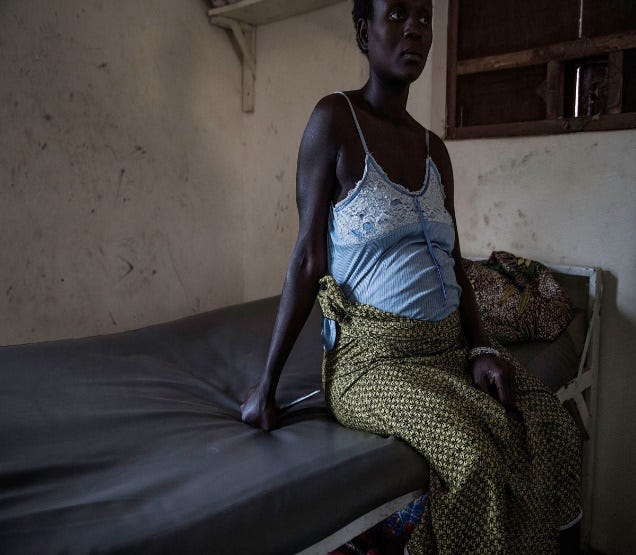
Image credit: Safe Motherhood Alliance
“As a first-time mother, I was consumed with anxiety and fear when I realised lack of access to sterile materials was leading many mothers to give birth at home, using whatever materials they had on hand from rusty blades and knives to plastic bags for gloves, making them vulnerable to infection and disease during birthing,” Mwanza says.
To get the materials they need, Mwanza says that pregnant women can make eight to ten trips to acquire all the necessary resources. The price can be anywhere between $30 to $50, meaning that some women cannot get what they need due to cost, lack of availability, and limited transportation access. Mwanza decided to develop a solution for herself and other pregnant women in low-income communities and rural areas to increase their opportunities to have a safe and sterile birth and help protect the health of both mother and child.
“Globally an estimated 100 million women give birth alone or with the help of an untrained traditional birth attendant, of this number over 800 pregnant women die each day from complications in pregnancy and childbirth, and for every woman who dies, approximately 20 others suffer serious injuries, infections or disabilities,” Mwanza explains. “Sub-Saharan Africans suffer from the highest maternal mortality ratio — 546 maternal deaths per 100,000 live births or 201,000 maternal deaths a year.” The disproportionate impact on the continent is stark, as the region’s fatalities are almost 50 times higher than any other in the world.
The Safe Motherhood Alliance was founded in 2017 as a direct response to Mwanza’s experience and research. As a result, 20 TBAs have been trained to work with the organisation to deliver improved medical products to their communities, and each is equipped with Safe Motherhood Alliance’s flagship product — Baby Delivery Kits, which they sell to mothers at a lower price than it would cost to collect each item individually.
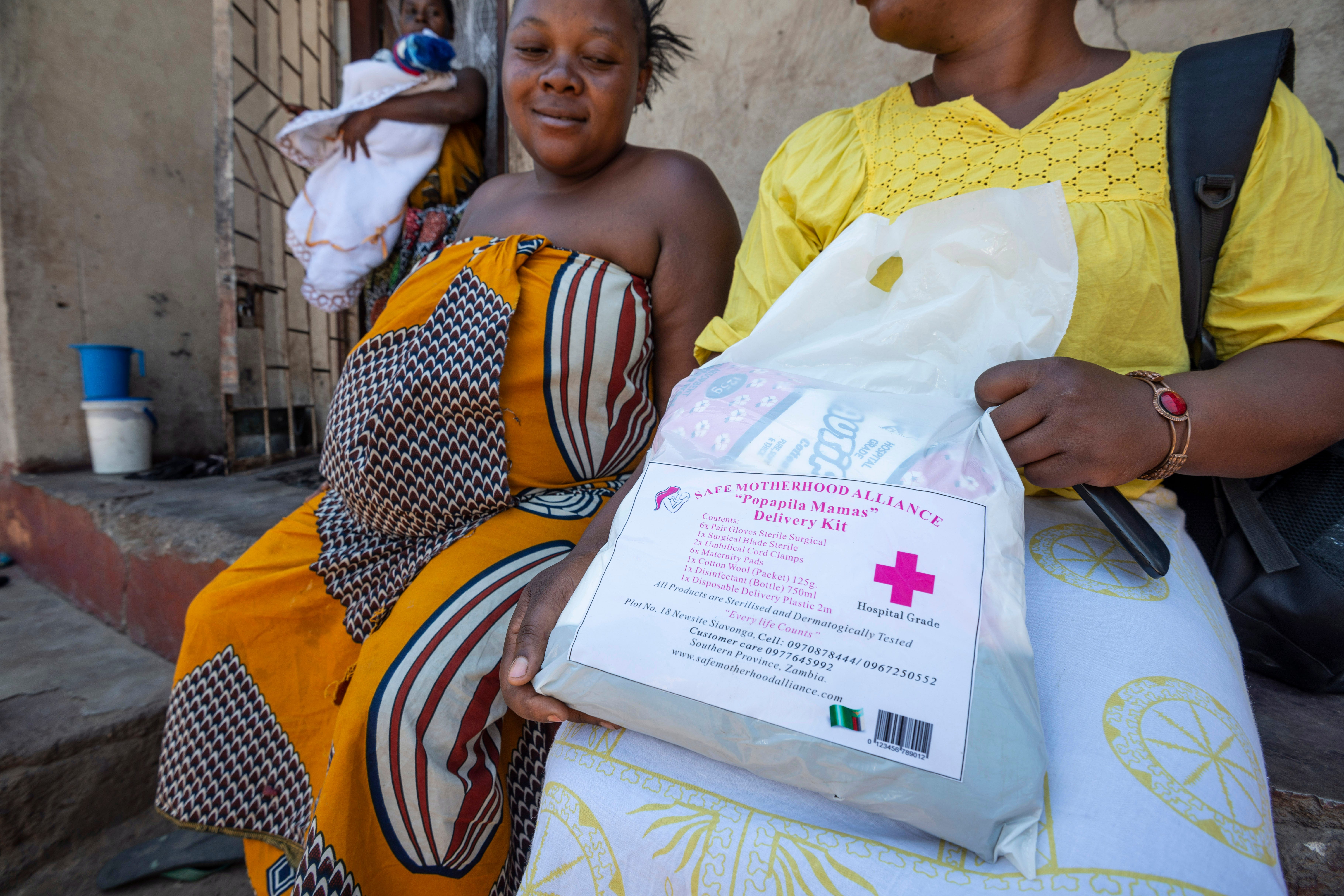
Baby Delivery Kit. Image credit: Safe Motherhood Alliance
Pandemic pressures and pregnancy
Already stressed medical facilities for pregnant women in her country were further challenged with the arrival of the COVID-19 pandemic. “When I first heard about COVID-19, I was worried about it because of its exponential growth across the world and the unprecedented rate that it was spreading in Zambia,” Mwanza says. “We started experiencing shortages of critical PPE for our staff that work in the frontlines of health facilities, and we had to find new ways to manage the crisis as the number of confirmed positive COVID-19 cases continued to rise daily.”
“Due to the nature of COVID-19 and the effects it could potentially have on pregnant women, obstetric providers (who focus on the female reproductive system) are having to reinvent maternal healthcare in real-time to protect themselves, mothers, and newborn children.” As a response, Mwanza and her team turned to the production of PPE materials, including 3D printed face masks and visors.
“Without adequate systems responses to the crisis, we will see a surge in the maternal mortality rates increase.”
The Alliance is leveraging its existing network of birth attendants to provide affordable healthcare to pregnant women in underserved communities and has trained its TBAs to be observers who can respond to real-time needs and inquiries that are COVID-related.
“Last mile health services, especially maternal healthcare, are underfunded and under-resourced leaving the virus to spread easily in these communities,” says Mwanza. “Pregnant women are more at risk especially during a lock-down which only allows essential services and patients to access health facilities and clinics when they are found and are open.”
Making sanitary protection sustainable
Mwanza is a civil engineer by training, but her immersion in business and impact has long roots. “I have always had a passion for social entrepreneurship from a young age because my parents inculcated a desire in me of living a life of purpose and of service, and I’ve carried it throughout my life,” she says.
Her previous roles might not immediately point to the foundation of a maternal support organisation. As an engineer, she has worked in integrated waste management, road infrastructure, drainage design, environmental management, and ran her own construction company. While becoming pregnant herself may have spurred the Safe Motherhood Alliance’s foundation, Mwanza’s work with materials and management put her in a prime position to recognise the wider issues around women’s health in her home country.
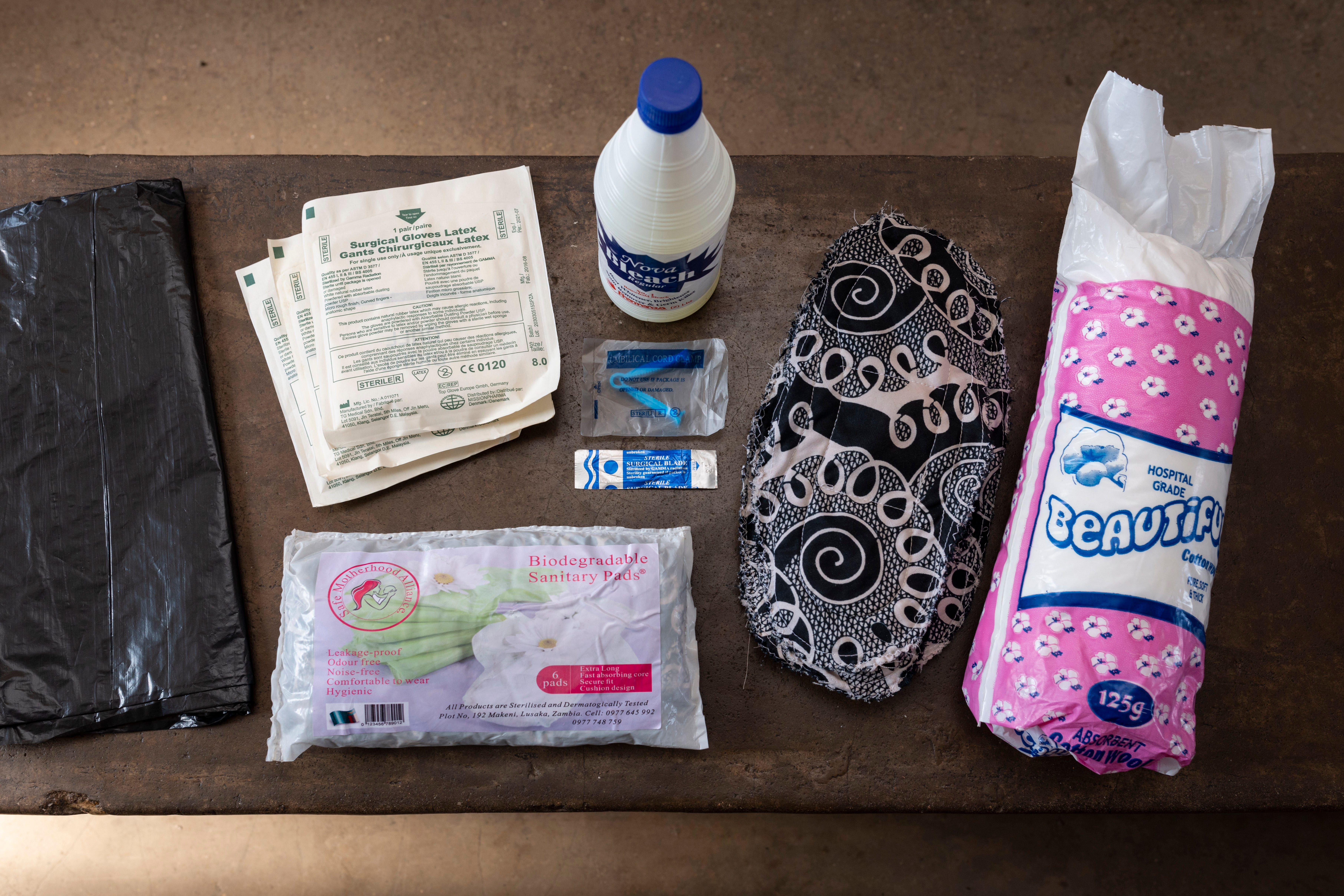
Contents of baby delivery kit including: sanitary pads, sterilizing agents, umbilical cord clips, plastic gloves, surgical blades, cotton wool, and more. Image credit: Safe Motherhood Alliance
While reviewing the Alliance’s Baby Delivery Kit contents, Mwanza and her team considered ways of manufacturing more expensive items in the package locally. Gloves, sanitary pads, and disinfectants were being imported from places like China and India, so they looked to local production to lower costs.
Initially, they reviewed cotton grown in Zambia but the material is expensive to process, and often, the chemicals used were detrimental to women’s health. The alternative product they honed in on may seem surprising but it not only solved the issue of local production but also environmental sustainability.
Zambia grows a lot of bananas and while it is the fruit that is most often considered to be of value, there’s more to the average banana tree and this is what Mwanza had her eye on. She set to work prototyping sanitary pads made from the absorbent fibres of banana skins.
The material, available in abundance, did not require the same heavy chemical processing as cotton. To make sanitary pads, the material does need some bleach to kill off any insects after the fibers have been made into a pulp. When the materials are ready, women in the local community sew the pads together for the final stage of production.
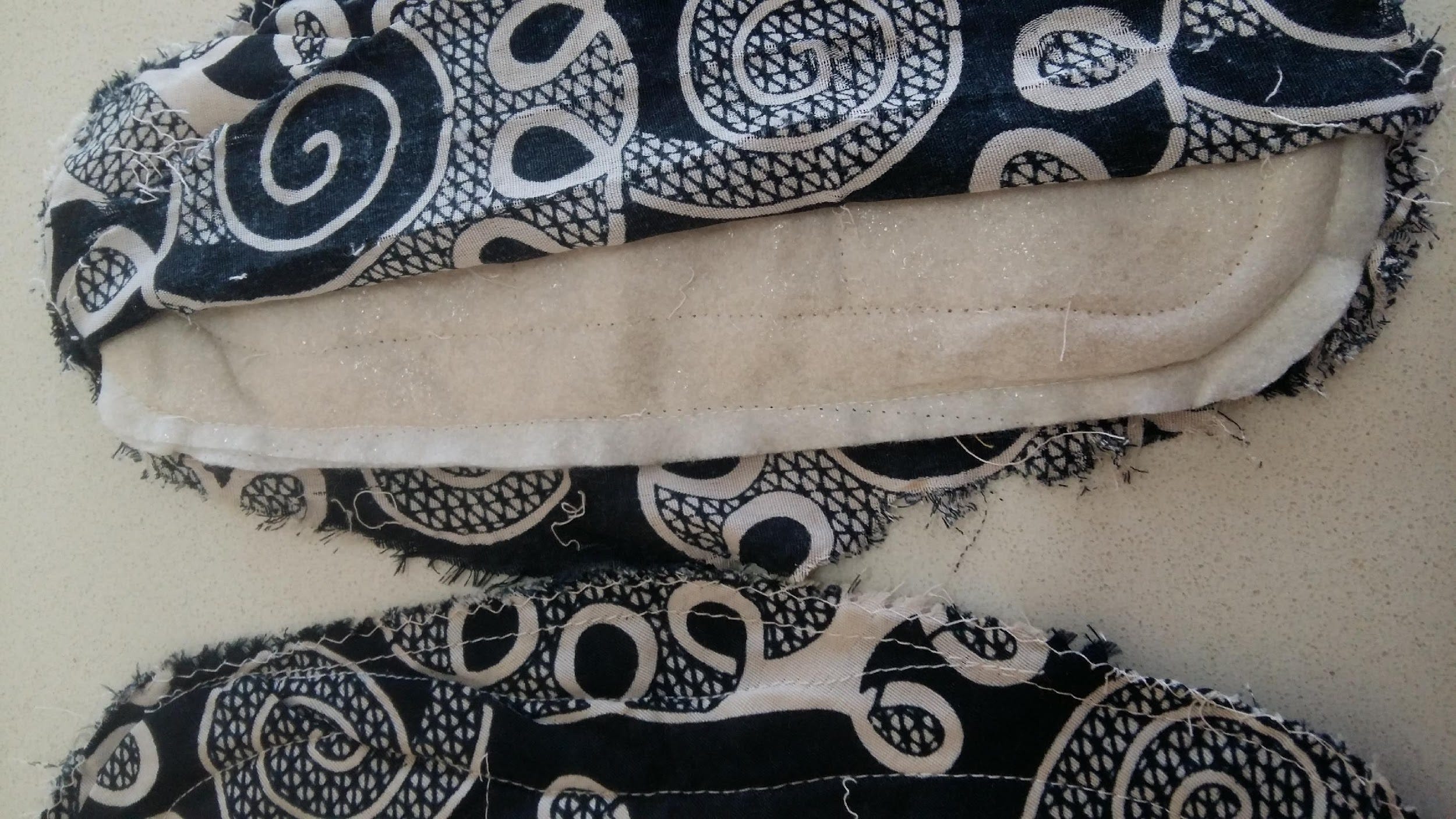
Sanitary pads made from absorbant banana skin fibres. Image Credit: Safe Motherhood Alliance.
“We are excited about this product because we also inadvertently solved a problem for adolescent girls who miss school because of their period and can’t afford the regular sanitary pads because of cost,” Mwanza says. “The pads are a vital part of the Baby Delivery Kit and this method of sourcing and production helps us to keep the price low. Once in full production, we’ll be able to reduce the cost of the kit from $10 to $5.”
This innovation serves the needs of new mothers and helps to support girls in the wider community by selling at a price point well below imported competitors and 50% below the lowest-price sanitary pads on the local market. “We’ll come out with a range of sanitary pads for women and girls,” Mwanza says. “A woman’s period should not be a source of shame for her but rather of pride because her body is doing what should be a natural process, but instead, it has become a point of discouragement. Girls shouldn’t stay away from school missing almost a month worth of classes per year because of this, and we hope to provide what they need to continue without inhibitions.”
A future for women and girls in Zambia
There is still plenty of work for the Safe Motherhood Alliance to do, and Mwanza continually keeps an eye on the impact of the support it provides as well as scanning the horizon for different ways to make life for mothers and women better.
According to the United Nations Children’s Fund (UNICEF), child health in Zambia has improved. The under-five mortality rate has dropped from 178 per 1,000 live births in 1992 to 75 per 1,000 in 2013. Infant mortality rates have also fallen from 96 per 1,000 to 45 per 1,000 during the same time period, but neonatal mortality remains a challenge.
“The mission of the Safe Motherhood Alliance is to bring simplicity and dignity to women’s health worldwide.”

Image Credit: Safe Motherhood Alliance
With a focus on research and training, Mwanza hopes to see improvement. “The social support we provide to women in communities is important. Research shows that those who considered themselves as traditional birth attendants lacked understanding of the causes of obstetric complications during childbirth and had inadequate knowledge of the appropriate management of labour. Culturally-specific knowledge from our impact study can be used to guide policy-makers and health planners in the future development of safe motherhood initiatives in developing countries.”
The Safe Motherhood Alliance hopes to raise awareness through community and antenatal clinics to help keep women informed on the services and options available to them. Being able to provide the basic kits needed for a safe birth will provide a safer start to life for infants and mothers. Additionally, as the pandemic continues to linger, finding better methods of production that is accessible in terms of cost and accessibility as well as providing health protection means that the wider picture of motherhood in Zambia is also being addressed.
Overall, Muzalema Mwanza has a core belief that she continues to pursue, “The mission of the Safe Motherhood Alliance is to bring simplicity and dignity to women’s health worldwide. Directly aligned with this mission is our aim to transform access to essential products that help women and their children survive, end preventable mortality and thrive.”
At COVIDaction, we are proud to support the work of Muzalema Mwanza and the Safe Motherhood Alliance to enhance positive behavioural change, adopt improved production methods, and tackle maternal and child mortality. Not only does the organisation address critical challenges to motherhood in Zambia, but its continued drive to find the best ways to innovate in a sustainable and local way is an inspiration to us all.
This blog post first appeared on https://medium.com/covidaction/local/home
